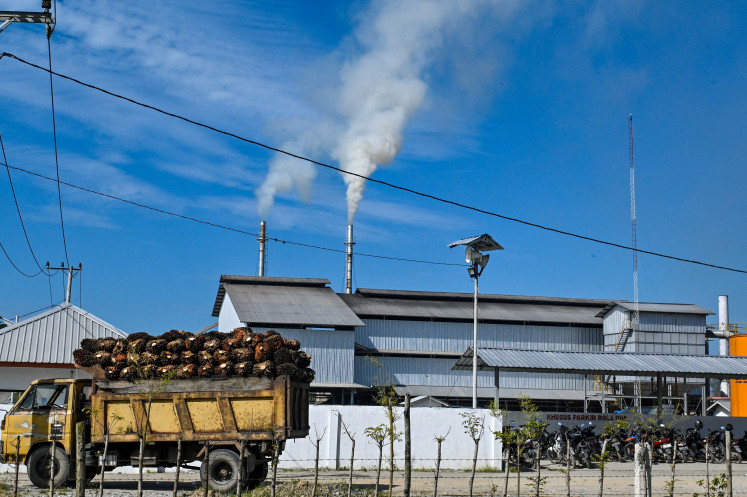Popular Reads
Top Results
Can't find what you're looking for?
View all search resultsPopular Reads
Top Results
Can't find what you're looking for?
View all search resultsAceh terror group shows extent of network
The recent police success in busting an Aceh-based terrorist network reveals the emergence of new alliances of organizations in the jihad movement in Indonesia
Change text size
Gift Premium Articles
to Anyone
T
he recent police success in busting an Aceh-based terrorist network reveals the emergence of new alliances of organizations in the jihad movement in Indonesia.
Counterterrorism experts say it calls for a fresh approach to effectively counter the threat of terrorism.
They also said the terrorist training camp discovered in Aceh belonged to a new group that was not directly linked to Jemaah Islamiyah (JI), blamed for the series of previous bomb attacks in Bali and Jakarta, or Noordin M. Top’s cell, a JI splinter named after its Malaysian-born leader who was killed in September.
Three experts – Sidney Jones of the International Crisis Group, former JI member Nassir Abbas and Andi Widjajanto of the University of Indonesia – gave their views about the latest developments in counterterrorism measures in a discussion organized by the Jakarta Foreign Correspondents Club on Wednesday.
Police raided the Aceh camp and a safe house in Pamulang, just south of Jakarta, earlier in March, killing Indonesia’s most wanted terrorists including Dulmatin and scores of others, arresting 71 people in two separate raids.
The Aceh group, according to Nassir, was formed by people who trained together in Mindanao, the Philippines. They combined from separate groups to work for a common cause. “Whoever wants to participate in jihad is welcome to join,” he said.
Most were disillusioned about JI, who they thought was losing its power, said Nassir. He left JI and now assists authorities in fighting terrorism.
Jones believed that the group was formed after Dulmatin returned from hiding in the Philippines sometime in 2008.
The new group, she said, “showed the extent of the jihad network in Indonesia.”
Andi warned that the discovery showed that the issue of terrorism had become more complex and there was a serious risk of a terrorist threat. “The Aceh and Pamulang incidents are strong indications that the network is strengthening.”
Jones and Nassir said the Aceh group was comprised of people from many organizations including JI, the Noordin M. Top cell, the Negara Islam Indonesia (NII), Wadah Islamiyah and other smaller groups.
Nassir said one major difference from JI and the Noordin group, which conducted suicide bombings, was that the Aceh group engaged its recruits in military training.
Rather than attacking foreigners, this group appears to be targeting Indonesian figures, including President Susilo Bambang Yudhoyono, he said.
Nassir said he did not know why Aceh was chosen as a base, given that the group was not supported by the local power as JI was when it opened training camps in Mindanao, Maluku and the Central Sulawesi district of Poso. None of those arrested had an organizational link to the Free Aceh Movement (GAM), the former local separatist group that signed a peace agreement with the government in 2005.
“They have built a graveyard, not a training camp,” he said, saying that locals notified the police about the camp in Aceh.
Neither Jones nor Nassir could provide insight into the group’s possible new location or where its funds came from.
“Its financing is the biggest mystery,” Jones said.
The speakers doubted the government’s plan to develop a new national anti-terror agency next month would be effective in fighting terrorism.
Jones identified Indonesia’s weaknesses were poor intelligence, poor monitoring of current and former prisoners, as well as a poor understanding about the radicalization process and recruitment methods. “These problems cannot be solved by creating a new national agency.”
Andi said this type of agency would be an inter-ministerial body. He said because ministers were likely to be focused on their fields of expertise, the agency would not likely be effective.
The Indonesian Military (TNI) will need to be involved if the threat of terrorism escalated, Andi argued. “This would be the last resort. We hope we can avoid employing this measure.”
Currently the police and their counterterrorism unit Densus 88 have sole authority in fighting terrorism.
The TNI is ready to assist the police if they are requested, Andi said.
A recent joint training by the National Police and the TNI at the capital’s strategic spots was undertaken to prepare for the highest-level possible scenario.










